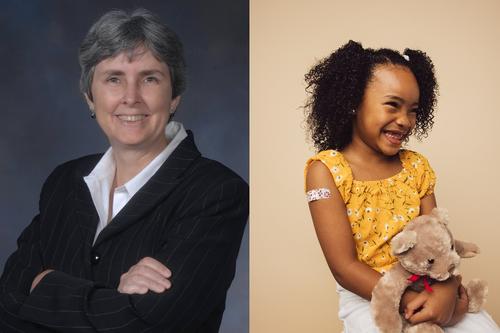
The return of in-person classes this fall has sparked a lot of dialogue among parents about the safety of COVID-19 vaccinations for children.
Jill Foster, MD, a professor of pediatrics at the University of Minnesota Medical School and pediatric infectious diseases physician with M Health Fairview, demystifies some of the concerns for parents of unvaccinated kids.
Q: What is known so far about the long-term effects of the COVID-19 vaccine in children?
Dr. Foster: With vaccines, we refer to short-term effects as within a few days and long-term effects being longer than that. So far, COVID-19 vaccines in children under 12 years of age have only been administered in clinical trials, and the numbers are too small to draw any conclusions yet about long-term effects — certainly, though, nothing concerning.
In the 12 and older age group, there have been rare instances of inflammation of the heart — myocarditis (muscle) or perimyocarditis (heart muscle and the fibrous sac surrounding the heart). What we know now about this is limited because it is so rare —with only a thousand cases out of 177 million vaccinated individuals per the CDC — but these tend to occur in male adolescents. However, all the individuals had relatively mild cases and recovered quickly. In fact, an individual is six times more likely to have myocarditis as a result of having COVID-19 infection than from getting the vaccine.
Q: Are the potential side effects of the COVID-19 vaccine different for children and adults?
Dr. Foster: Yes, the short-term side effects are the same in the teens who have been immunized. In regards to children under the age of 12 — this is all too new to say for sure, but given our experience with vaccines in general over the last century, the answer is probably no. The majority of vaccines are given to infants and have no long-term side effects, despite intensive efforts to try to find a link. If you search on the internet for side effects, there will be plenty of websites offering opinions on it but none have borne out to be anything more than coincidence. This includes the disproven link between the MMR vaccine and a number of things, including autism.
Q: Does the COVID-19 vaccine negatively impact a child’s future fertility?
Dr. Foster: We have nothing, either in limited experience or even theory, to suggest a link between the COVID-19 vaccines and future fertility. Sites on the internet will try to tell you otherwise — the most common one being that there is similarity between a protein in the placenta and the COVID antibody. If that were true, it could be compared to your ability to call someone when only knowing one digit of their phone number. No link has been found that COVID antibodies produced by having COVID interfere with fertility.
Q: Why did it take longer for COVID-19 vaccines to be approved for children than adults?
Dr. Foster:There are several reasons why. First, is that vaccines are tested first in adults and then children, so we are still playing catch up. Secondly, there is always more caution in testing vaccines and medication in children. We want to make sure that we get the dose right — such as measuring if a smaller amount is needed — and we spend additional time monitoring for any potential side effects.
Q: If a child is under the age of 12 and can’t be vaccinated, how can parents prepare them to safely return for in-person classes?
Dr. Foster: Without vaccines, children are more vulnerable than adults, so they need to be extra careful. They must wear masks when around others, and the masks should fit well so they are primarily breathing through them not around them. If possible, don’t reuse a worn mask for more than one day. If disposable, then throw it out after one day. For cloth masks, wash them in between uses. Continually reinforce the need for hand washing and physical distancing, even though it seems like it’s getting old now. Avoid crowded indoor spaces around people you don’t trust to be taking precautions, especially if there isn’t good ventilation.
Jill Foster, MD, is a professor of pediatrics at the University of Minnesota Medical School and pediatric infectious diseases physician with M Health Fairview. Her expertise is in prevention and treatment of viral diseases, and in mobilizing public health and healthcare systems in the areas of prevention and screening.
-30-
About “Talking...with U of M”
“Talking...with U of M” is a resource whereby University of Minnesota faculty answer questions on current and other topics of general interest. Feel free to republish this content. If you would like to schedule an interview with the faculty member or have topics you’d like the University of Minnesota to explore for future “Talking...with U of M,” please contact University Public Relations at [email protected].
About the University of Minnesota Medical School
The University of Minnesota Medical School is at the forefront of learning and discovery, transforming medical care and educating the next generation of physicians. Our graduates and faculty produce high-impact biomedical research and advance the practice of medicine. We acknowledge that the U of M Medical School, both the Twin Cities campus and Duluth campus, is located on traditional, ancestral and contemporary lands of the Dakota and the Ojibwe, and scores of other Indigenous people, and we affirm our commitment to tribal communities and their sovereignty as we seek to improve and strengthen our relations with tribal nations. For more information about the U of M Medical School, please visit med.umn.edu.
- Categories:
- Health
- COVID-19
- Early childhood
- Infectious diseases




